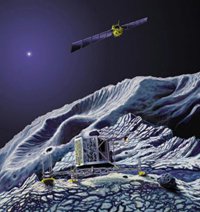Projects
Rosetta

ESA's Rosetta spacecraft will be the first to undertake the long-term exploration of a comet at close quarters. It comprises a large orbiter, which is designed to operate for a decade at large distances from the Sun, and a small lander. Each of these carries a large complement of scientific experiments designed to complete the most detailed study of a comet ever attempted.
After entering orbit around Comet 67P/Churyumov-Gerasimenko in 2014, the spacecraft will release a small lander onto the icy nucleus, then spend the next two years orbiting the comet as it heads towards the Sun. On the way to Comet Churyumov-Gerasimenko, Rosetta will receive gravity assists from Earth and Mars, and fly past main belt asteroids.
People
Bonnie Buratti
Science Division - Senior Research Scientist, JPL Fellow, Europa Clipper Deputy Project Scientist
Science Division - Senior Research Scientist, JPL Fellow, Europa Clipper Deputy Project Scientist


